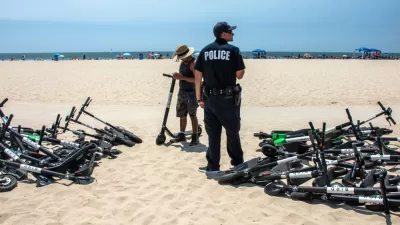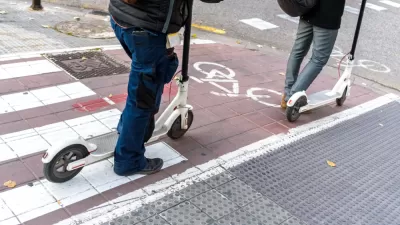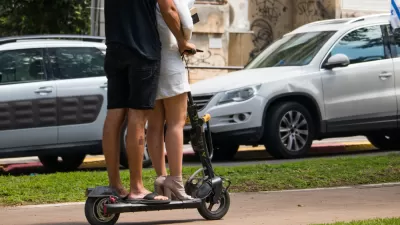The most topical show on television got in on the e-scooter craze this week.

South Park placed e-scooters, perhaps the most hotly-contested signifiers of contemporary urban living, at the center of its most recent Halloween episode. In the episode, titled "The Scoots," dockless electric scooter share (called "e-scooters" in most places, as well as in South Park) arrives in massive numbers, changing the Halloween game forever.
All of the kids in South Park and the surrounding region discover the potential of e-scooters to speed up trick-or-treating operations, setting off an absurd scene of adult panic as dystopian levels of micro-mobility on Halloween. Despite its absurdity, the hysteria feels familiar. I'll leave it to you to decide which side of the scooter debate is being satirized (or maybe it's both).
A few more obvious, serious points are made along the way, however, namely with regard to the plight of Kenny McCormick. As one of the very few low-income residents in South Park, Kenny doesn't have a phone and thus can't access the e-scooters. Those who don't think South Park's creators are capable of slipping a message about social and economic inequality into an otherwise absurd rendering of American culture probably have never seen the show. The point about cell phones as the key enabler of economic and social mobility is subtle enough that one might even read this episode as a critique of smart phones, rather than e-scooters, like John Hugar did for AV Club.
Meanwhile, the school's counselor, Mr. Mackey (serving as the adult protagonist of the episode), struggles to reckon with e-scooters as a popular form of transportation. "I just think people should drive," says Mackey. "I don't think people should scoot. I just hope the future isn't scooting."
It's clear that Mackey speaks for a lot of people in a lot of cities in his preference for the car over all alternative forms of transportation (remember, the lyrics of the show's opening song includes the words "ample parking day or night"). Mackey spends the show haunted by the e-scooters, despite rounding up all the scooters and dropping them off a Tim Burton-sized cliff. In addition to e-scooters multiplying rapidly every time Mackey turns his back, one of the show's best recurring bits is e-scooter riders repeatedly running into Mackey's car, lamely issuing the apology of "sorry dude."
Mackey's hot take on "scooting" also isn't too far off the mark from Stan Marsh's review of his first ride on a scooter: "pretty stupid but sweet." The "cool" factor of e-scooters is an underreported dynamic in the whole micro-mobility revolution. Until recently very few people could have even remotely considered scooters to be cool. Still, the adoption rate of the scooters is remarkably conspicuous. Mr. Mackey speaks for all of us when he's caught completely off-guard by the sudden ubiquity of scooters and people riding scooters. It's almost as if there was pent up demand for the ability to zip around without a car for once in their lives. It's almost as if e-scooters have found a broadly appealing niche that triangulates the benefits of walking, driving, and riding a bike. Maybe it's driving that isn't as cool as most people assumed.
Maybe it's time for Mackey to adjust his attitude, and accept that scooters might be pretty stupid, but they're also sweet. And it's definitely time to get Kenny on a scooter.
While South Park is famous for lambasting anything or anyone in the public eye, e-scooters don't come off as a force of evil. It's excess that's the subject of satirical scorn. Excess is why we can't have nice things: excessive driving, excessive scooting, excessive Halloween candy, excessive competition, excessive entitlement.
With that, here's the Planetizen Scooter Media Brief for the end of October:
National News
- Electric scooter giant Lime says it recalled scooters amid fears that some could catch on fire (The Washington Post, October 30)
- Bird poll: Voters would make 'interesting sacrifices' to reduce time spent in traffic (Smart Cities Dive, October 26)
- Scooter companies are moving fast and breaking people, but they say they’re not to blame (The Verge, October 24)
National Commentary
- Public transit has been declining in the US for seven years. Scooters and bike-share could help save it. (Quartz, November 1)
- Hey Cyclists, Electric Scooters Are Not the Enemy (Bicycling, October 26)
Local News
- Detroit is about to see many more Bird and Lime scooters (Detroit Free Press, October 24)
- How many people are getting hurt on electric scooters in Dallas? Hospitals may have the answers (Dallas Morning News, October 24)
- Back for a week, e-scooters in San Francisco draw fewer complaints this time around (San Francisco Examiner, October 23)
- Lyft scooter hit DC streets (WTOP, October 18)

Alabama: Trump Terminates Settlements for Black Communities Harmed By Raw Sewage
Trump deemed the landmark civil rights agreement “illegal DEI and environmental justice policy.”

Planetizen Federal Action Tracker
A weekly monitor of how Trump’s orders and actions are impacting planners and planning in America.

The 120 Year Old Tiny Home Villages That Sheltered San Francisco’s Earthquake Refugees
More than a century ago, San Francisco mobilized to house thousands of residents displaced by the 1906 earthquake. Could their strategy offer a model for the present?

In Both Crashes and Crime, Public Transportation is Far Safer than Driving
Contrary to popular assumptions, public transportation has far lower crash and crime rates than automobile travel. For safer communities, improve and encourage transit travel.

Report: Zoning Reforms Should Complement Nashville’s Ambitious Transit Plan
Without reform, restrictive zoning codes will limit the impact of the city’s planned transit expansion and could exclude some of the residents who depend on transit the most.

Judge Orders Release of Frozen IRA, IIJA Funding
The decision is a victory for environmental groups who charged that freezing funds for critical infrastructure and disaster response programs caused “real and irreparable harm” to communities.
Urban Design for Planners 1: Software Tools
This six-course series explores essential urban design concepts using open source software and equips planners with the tools they need to participate fully in the urban design process.
Planning for Universal Design
Learn the tools for implementing Universal Design in planning regulations.
Clanton & Associates, Inc.
Jessamine County Fiscal Court
Institute for Housing and Urban Development Studies (IHS)
City of Grandview
Harvard GSD Executive Education
Toledo-Lucas County Plan Commissions
Salt Lake City
NYU Wagner Graduate School of Public Service






























